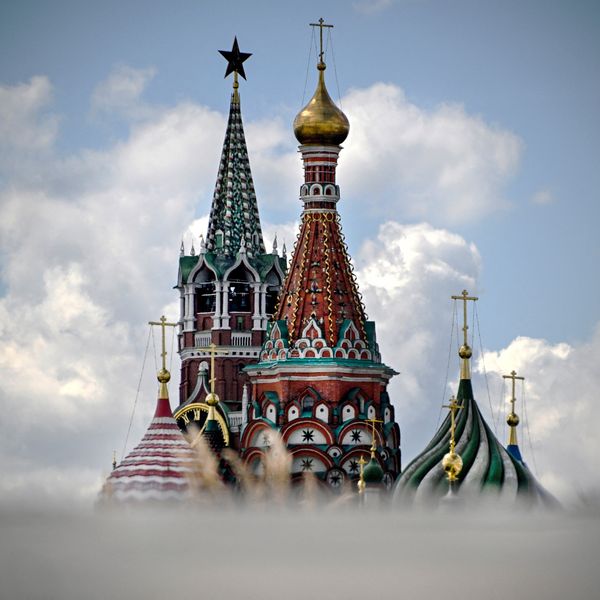Will Congress reassert itself by passing new economic sanctions against Russia for using hacked emails to disrupt the U.S. presidential election if President-elect Donald Trump objects?
Last Friday, Sen. John McCain (R-Ariz.) said on Ukraine television that the hacking was equivalent to an attack on a country and thus “an act of war.” In response, McCain said, “We have to make sure that there is a price to pay so we can perhaps persuade Russians to stop this kind of attacks on our very fundamentals of democracy.”
Trump clearly does not see it that way.
On Thursday, while maintaining he still has doubts about a Russian role, Trump said the country should “move on to bigger and better things” rather than focusing on the hacking.
On Saturday evening, he tossed out a new thought, telling reporters, “I know a lot about hacking, and hacking is a very hard thing to prove. So it could be somebody else. And I also know things that other people don’t know, and so they cannot be sure of the information.”
Trump said he would disclose his new hacking information today or Wednesday. He also said he would again take a closed briefing from the Intelligence Community on its information on the hacking, gratuitously adding, “in the interests of our country and its great people.”
Public attention to the Russian hacking will be generated this coming Thursday when McCain, as chairman of the Senate Armed Services Committee, holds a scheduled public hearing on “Foreign Cyber Threats to the United States,” with Director of National Intelligence James Clapper, Under Secretary of Defense for Intelligence Marcel Lettre, and National Security Agency Director Adm. Michael Rogers as witnesses.
More than the Russian use of hacked materials in the U.S. should be discussed. There should be discussion of reports that the Russians have already geared up to affect coming elections in France and Germany.
Several Republican members of the panel have been outspoken about the Russian hacking and even critical that President Barack Obama’s Thursday response was not tough enough.
McCain and his committee colleague, Sen. Lindsey Graham (R-S.C.) have already called for increased economic sanctions on Moscow, with the latter saying last Wednesday they should be “tougher than the ones we already have.”
On Fox News Sunday, Sen. Tom Cotton (R-Ark.), an Armed Services panel member and strong Trump supporter, said, “I'm glad the president [Obama] has finally realized the threat that Russia poses to the United States and our interests, but I wish he had recognized this eight years ago.”
Cotton did not say what he wanted Congress to do about Russia but only that Putin “needs to have a sense of boundaries and to know that costs are going to be imposed [by the U.S.] if he crosses those boundaries.”
While Trump has not been specific about what he has in mind when it comes to a new U.S. relationship with Russia, his post-election exchanges with Russian President Vladimir Putin have indicated they both want to dismiss the hacking issue. Putin said on December 23 he wanted to “put them [relations with Washington] back on track.” Trump has called for "a positive relationship," whatever that means.
It does not clarify things when Trump spokesman Sean Spicer, the incoming White House press secretary, makes meaningless statements, as his did on ABC News on Sunday, when he said, “Donald Trump recognizes that a good leader is going to protect America's interests by making sure that we have a relationship with Russia, that our interests are protected, not theirs.”
A close reading of Putin’s marathon, year-end, December 23 press conference shows why the Russian leader fears new U.S. economic sanctions and wants current ones ended.
He admitted the Russian economy is suffering with the nation’s GDP dropping last year 0.55 percent. Combined with inflation at 5.5 percent, consumers and particularly government pensioners are suffering. One result, Putin said, is that defense spending, which had been on a high level, will be cut significantly over the next three years.
He also conceded that there has been trouble in meeting economic promises to the Crimean people, who were annexed to Russia in 2014. “It turned out that rapid integration came with legal and economic complications,” was Putin’s excuse.
Showing another impact of sanctions, Putin said a program called “import replacement” has been put into effect, creating domestic industries to replace things that can no longer be purchased. Like Iran, which is doing something similar, Russia has “seen serious internal structural changes,” Putin said, including the need for “achieving technological independence” in the defense industry.
An issue not raised with Putin, but one Russia must face, is who is going to cover the $180 billion the World Bank estimated earlier this year that will be needed to rebuild Syria?
In November, a European diplomat told Putin a version of what former Secretary of State Colin Powell said about the U.S. invasion of Iraq, “What Russia breaks is what Moscow will have to fix.” Putin last October called for “a kind of Marshall Plan to revive this war and conflict-torn region.” There has been little international response, except for the current U.S. and European Union initiated effort to assist refugees from Syria.
Given that Russia, Iran, and Turkey—the three countries now running the attempt to keep Syrian President Bashar al-Assad in power—cannot on their own afford to finance the reconstruction effort, perhaps that is what Putin has in mind for his call for Trump’s America to join the effort.
In any event, current sanctions are affecting Russia’s economic condition, and if Congress puts further demands on it with new sanctions – caused by Moscow’s own foreign adventurism – it may have the desired effect in time of moderating Putin’s policies.
Rep. Adam Schiff (D-Calif.), ranking minority member of the House Permanent Select Committee on Intelligence, said on Fox News Sunday, there is “bipartisan support in Congress for stronger sanctions against Russia.”
It’s time to see if that is true.









